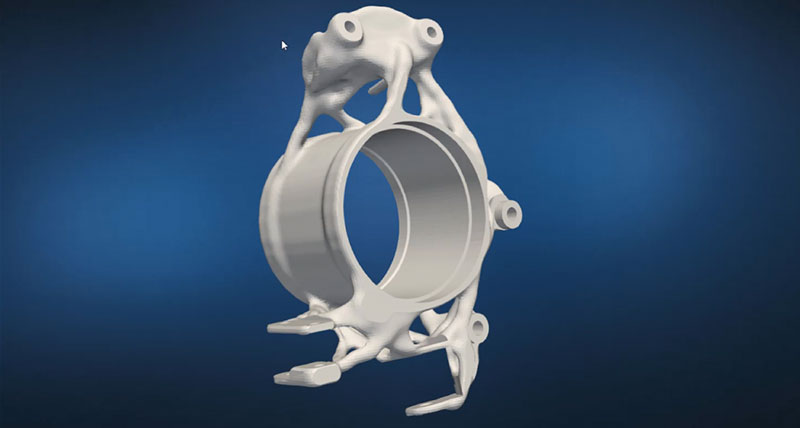MSC Apex Generative Design produces stress-optimised, 3D printable designs automatically to reduce design cycles from days to hours
MSC Software Corporation (MSC), a global leader in computer-aided engineering (CAE) simulation software and services, today announced MSC Apex Generative Design, a new design optimisation solution that improves quality through unparalleled automation of design processes with embedded manufacturing knowledge.
MSC Apex Generative Design aims to improve productivity by up to 80 percent compared to classic topology optimisation. The software produces a part design that is ready for additive manufacturing (DfAM) within a few hours – a fraction of time usually required – making reliable additive manufacturing more cost efficient and accessible.
Re-thought design optimisation
In MSC Apex Generative Design, the designer only needs to specify the boundary conditions and design objective. Multiple lightweight design candidates that explore the possibilities of the design space will be produced that provide optimal stress distribution and minimize weight. This enhances the creative process, so designers have more time to optimise the product’s concept and integrate additional features that add value. The software’s intelligent smoothing technology ensures that every candidate has a perfect finish that is ready for print.
“New design freedoms in additive manufacturing require a new generation of software solutions that take full advantage of the new DfAM possibilities. We make the generative design process smarter by producing design candidates that both satisfy the engineering criteria and look as the designer intended when 3D printed,” said
Dr. Thomas Reiher, Director of Generative Design.
Fully integrated design optimisation process
Conventional topology optimisation workflows require manual work and multiple tools to achieve production-ready results, which can lead to information loss as data is converted. MSC Apex integrates all relevant steps within one Computer Aided Engineering (CAE) environment to improve productivity with a single user experience from design to additive manufacturing preparation.
The design process is workflow-oriented, providing easy and fast model setup from existing geometries or mesh in common CAD, STL, or MSC Nastran BDF formats. Designers can find optimized design candidates and perform design validation within the same CAE environment, simplifying the work process and reducing design iterations dramatically. The result is a fully integrated, automated optimization process in which compatibility for previous and subsequent operations plays a vital role. This unique capability implies the conversion from the CAE mesh to CAD with no manual reconstruction of geometry, considerably simplifying the work process for designers.
Validated for additive manufacturing
The MSC Apex Generative Design for Additive Manufacturing solution combines print-ready geometries with robust metal (Simufact) and polymer (Digimat) build process simulation from Hexagon’s additive manufacturing portfolio. Designers only generate part designs that can be successfully manufactured using their chosen material and print process to eliminate costly prototyping.
“Additive manufacturing promises innovation and manufacturing productivity advances. But to truly transform, the new technologies require automated design workflows with embedded process knowledge. We are integrating our structural analysis, design optimization, and manufacturing simulation solutions to optimise and validate designs for additive processes before a single part is printed.” said Hugues Jeancolas, VP Product Management
www,hexagon.com
